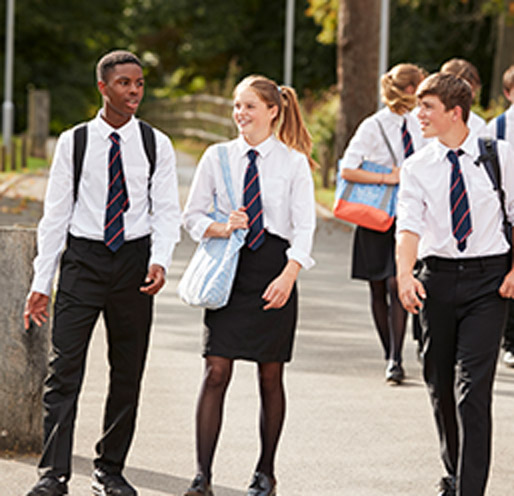Privacy Notice – General Data Protection Regulation – Data Protection Act
How we use Student Information
The EU General Data Protection Regulation (GDPR)
On the 25th May 2018 the General Data Protection Regulation (GDPR) became applicable and the Data Protection Act (DPA) was updated by a new Act.
Data Controller
Holy Trinity Church of England Secondary School complies with the GDPR and is registered as a ‘Data Controller’ with the Information Commissioner’s Office (Reg. No. Z7244027).
The Data Protection Officer (DPO) for the school is provided by Bulletproof Cyber Ltd.
We ensure that your personal data is processed fairly and lawfully, is accurate, is kept secure and is retained for no longer than is necessary.
The Legal Basis for Processing Personal Data
We process personal data because it is necessary in order to comply with the school’s legal obligations and to enable it to perform tasks carried out in the public interest. We are required by The Education (Pupil Information) (England) Regulations 2005 to maintain a Pupil’s Educational Record.
How we use information
We collect and hold personal information relating to our pupils and those involved in their care, we may also receive information from previous schools, the local authority(s) and/or the Department for Education (DfE). We use this personal data to:
- support our pupils’ learning
- support our pupils’ welfare
- monitor and report on their progress
- provide appropriate pastoral care;
- assess the quality of our services;
- process any complaints;
- protecting vulnerable individuals;
- the prevention and detection of crime
- comply with the law regarding data sharing
- organise alumni events
- provide relevant information to alumni
This information will include a child’s Unique Pupil Number (UPN), name, address, contact details, carers details, national curriculum assessment results, examination results, internal assessment results, school reports, behavioural information, attendance information, any exclusion information, where they go after they leave us and personal characteristics such as their ethnic group, any special educational needs or disabilities they may have as well as relevant medical information.
In addition, in order to meet our legal obligation to ensure that students entering our sixth form qualify for funding, we will collect nationality and place of birth.
Individual examination results for students, who have achieved high grades or made excellent progress, are published in the local press and media and also on Holy Trinity’s website and social media accounts.
For pupils enrolling for post 14 qualifications, the Learning Records Service will give us the unique learner number (ULN) and may also give us details about your learning or qualifications.
Collecting pupil information
Whilst the majority of pupil information you provide to us is mandatory, some of it is provided to us on a voluntary basis. In order to comply with the General Data Protection Regulation, we will inform you whether you are required to provide certain pupil information to us or if you have a choice in this.
Who we share data with
We may pass data to:
- third-party organisations, as allowed by law
- agencies that provide services on our behalf
- agencies with whom we have a duty to co-operate
- ongoing schools
We do not share information about our pupils with anyone without consent unless the law and our policies allow us to do so.
For further information about who we share with and why please see APPENDIX A.
In addition, we use some systems to process student data where the data is held either in a website or an external supplier’s system. For further detail about such systems please see APPENDIX B.
Retention Periods
Personal data will be retained by the school in accordance with the Data Retention guidelines in the Information Management Toolkit for Schools (IRMS). Electronic and paper student records (excluding contact information) will be held until a student reaches the age of 25 in accordance with the Limitation Act 1980 (Section 2) (or age of 30 if the student was statemented or had an EHCP in order to protect against a “failure to provide a sufficient education” case.
After this time the school will maintain a school roll detailing the names of students who have been to the school with their dates of birth and recording between which dates they attended Holy Trinity. This will enable ex-students to allow potential employers to check this information.
Personal telephone numbers and email addresses supplied by alumni will be deleted after a year.
Photographs
As part of our recording of events, celebrations and achievements, The Holy Trinity Church of England Secondary School may wish to take photographs of activities that involve your child. The photographs may be used for displays, publications and website(s) by the school, Local Authority (LA), local newspapers and other approved partners such as charities we support and local businesses working in partnership with the school on such things as enterprise challenges.
Photography and/or filming will only take place with the permission of the Head teacher and under appropriate supervision. When filming or photography is carried out by the news media, children may be named but home addresses will not be disclosed. Images that might cause embarrassment or distress will not be used, including images associated with material on sensitive issues.
When a student joins the school, parents are asked to indicate whether they are happy for photographs of their son/daughter to be used on school, local authority or press websites; inside school only; or do not want any photographs of their son/daughter to be published at all.
All students have a photograph taken and stored internally in order to identify them for safeguarding purposes. This photograph will also be used on their student id card.
CCTV
The school operates CCTV on the school site as it is considered necessary to protect students’ safety and/or the school’s property
Remote Learning
The school has procedures for providing Remote Learning and these are set out in the Remote Learning Guide published on the school website. This enables the curriculum and other school activities to be delivered remotely in the event that the school is not able to be open to all students and/or staff.
In the event of lessons or meetings taking part either wholly or partly online e.g. via TEAMS. Students or other participants must not in any circumstances record any part or all parts of the live streaming session. The school is the data controller for the live streaming session and does not consent to anyone taking a recording of it either audio or video. No person taking part has given consent to any recording and there is no legal right to take a recording. If it is discovered that a person has not complied with these requirements the police will be notified. We appreciate your understanding that we are all responsible for the well-being of our children and their privacy and we trust that you will not act in a way which would be considered a misuse of the private information of others.
Biometrics
The school operates biometric recognition systems for purchasing food in the refectory.
All data collected will be processed in accordance with the GDPR Data Protection Principles and the Protection of Freedoms Act 2012.The written consent of at least one parent will be obtained before biometric data is taken and used. If one parent objects in writing, then the school will not take or use a child’s biometric data.
For more information about biometric data please refer to the ICO Guidance at the link below:
Rights
You have the right to:
- be informed of data processing (which is covered by this Privacy Notice)
- access information (also known as a Subject Access Request)
- have inaccuracies corrected
- have information erased
- restrict processing
- data portability (this is unlikely to be relevant to schools)
- intervention in respect of automated decision making (automated decision making is rarely operated within schools)
- Withdraw consent (see below)
- Complain to the Information Commissioner’s Office (See below)
To exercise any of these rights please email office@holytrinity.w-sussex.sch.uk and mark the email for the attention of the Performance and Improvement Manager.
Withdrawal of Consent
The lawful basis upon which the school processes personal data is that it is necessary in order to comply with the school’s legal obligations and to enable it to perform tasks carried out in the public interest.
Where the school processes personal data solely on the basis that you have consented to the processing, you will have the right to withdraw that consent.
Complaints to ICO
If you are unhappy with the way your request has been handled, you may wish to ask for a review of our decision by contacting the DPO.
If you are not content with the outcome of the internal review, you may apply directly to the Information Commissioner for a decision. Generally, the ICO cannot make a decision unless you have exhausted our internal review procedure. The Information Commissioner can be contacted at:
The Information Commissioner’s Office,
Wycliffe House,
Water Lane,
Wilmslow,
Cheshire
SK9 5AF
Appendix A
Who we share data with and why
Youth Service
Once pupils reach the age of 13, the law requires us to pass on certain information to the provider of Youth Support Services in our area. This is the local authority support service who have responsibilities in relation to the education or training of 13-19 year olds under section 507B of the Education Act 1996. The County Council has a statutory responsibility to ensure that young people aged 16 to 18 in its area are able to engage in suitable education, training or employment. As part of this process students who have left the school and their parents may be contacted by WSCC Careers advisers or WSCC staff, asking for information on their current educational and employment details.
We may also share certain personal data relating to children aged 16 and over with post-16 education and training providers in order to secure appropriate services for them. A parent/guardian can request that only their child’s name, address and date of birth be passed to the provider of Youth Support Services in your area by informing Mrs Farr. This right is transferred to the child once he/she reaches the age 16.
For more information about services for young people, please go to the local authority website https://www.westsussex.gov.uk/ .
CaterLink
Caterlink staff are contractually engaged to operate catering within school and are responsible for operating our refectory. Therefore, student names, biometric information and food related allergies, intolerances and medical conditions are passed to Caterlink for the purpose of maintaining lunch accounts.
Career Guidance
As part of our statutory obligation to provide impartial careers advice and guidance to our learners in Year 7 to Year 13, we will work with independent, highly qualified Careers Guidance Advisors to deliver one-to-one personal guidance and share names of learners in key stage 4 and key stage 5 to our trained advisors, in order for them to run Careers Guidance Interviews, Trio Guidance Sessions and targeted CEIAG & Work-related Workshops. The personalised guidance aims to raise awareness of progression and careers opportunities so that our learners are supported in making informed decisions about their futures.
We will also work with The Careers Enterprise Company through their Enterprise Advisory Network, Thales through their Schools Partnership Programme and Uni Connect and provide statistical data about students to aid the allocation of funding and resources where it is in the best interests of our learners. The school will also provide its independent careers adviser with student names and age for the purpose of 1-1 guidance interviews delivered on site. We will also provide information on careers and appropriate further study pathways using a careers software platform known as Unifrog and UCAS, by sharing student information with these organisations. Further details of Unifrog are available in Appendix B.
In addition, we will work with the Sussex Learning Network and Elev8 Careers as part of their Get Career Confident programme. Sussex Learning Network is a partnership of further education colleges, universities, local authorities and local enterprise agencies, which aims to enable all young learners in the region to access, participate in and progress through to higher-level education. Get Career Confident delivers one-to-one personal guidance to learners across Sussex via trained advisor [Level 7].
As part of our Work Experience Programmes in key stage 4 & key stage 5, the school will share student information with Education Business Partnership [EBP] and employers to facilitate safe and personal work experience placements for students engaged in this aspect of their careers education.
Exam Boards
Students’ exams-related data may be shared with the following organisations:
- Awarding bodies
- Joint Council for Qualifications
- Department for Education; Local Authority;
This data may relate to exam entries, access arrangements, the conduct of exams and non-examination assessments, special consideration requests and exam results/post-results/certificate information.
Department for Education (DfE)
We are required to share information about our pupils with our local authority (LA), the Department for Education (DfE) and their agents under section 3 of The Education (Information About Individual Pupils) (England) Regulations 2013. To find out more about the data collection requirements placed on us by the Department for Education go to https://www.gov.uk/education/data-collection-and-censuses-for-schools.
Some of this information is then stored in the National Pupil Database (NPD). The law that allows this is the Education (Information About Individual Pupils) (England) Regulations 2013.
To find out more about the NPD, go to https://www.gov.uk/government/publications/national-pupil-database-user-guide-and-supporting-information
The DfE may also share pupil level personal data that we supply to them, with third parties. This will only take place where legislation allows it to do so and it is in compliance with GDPR
Decisions on whether DfE releases this personal data to third parties are subject to a robust approval process and are based on a detailed assessment of who is requesting the data, the purpose for which it is required, the level and sensitivity of data requested and the arrangements in place to store and handle the data. To be granted access to pupil level data, requestors must comply with strict terms and conditions covering the confidentiality and handling of data, security arrangements and retention and use of the data.
For more information on how this sharing process works, please visit: https://www.gov.uk/guidance/national-pupil-database-apply-for-a-data-extract
For information on which third party organisations (and for which project) pupil level data has been provided to, please visit:
https://www.gov.uk/government/publications/national-pupil-database-requests-received
If you need more information about how the local authority and/or DfE collect and use your information, please visit:
- our local authority at https://www.westsussex.gov.uk/ or
- the DfE website at https://www.gov.uk/data-protection-how-we-collect-and-share-research-data
Clinical Commissioning Groups (CCGs)
We are required, by law, to pass certain information about our pupils to CCGs.
CCGs use information about pupils for research and statistical purposes, to develop, monitor and evaluate the performance of local health services. These statistics will not identify individual pupils. It is necessary for certain health information about children (for example, such as their height and weight) to be retained for a certain period of time (designated by the Department of Health) and requires these CCGs to maintain children’s names and addresses for this purpose. CCGs may also provide individual schools and Local Authorities (LAs) with aggregated health information which will not identify individual children.
Local Authority – education and training
We are required, by law, to pass certain information about our pupils to local authorities.
The LA holds information about young people living in its area, including about their education and training history. This is to support the provision of their education up to the age of 20 (and beyond this age for those with a special education need or disability). Education institutions and other public bodies (including the Department for Education (DfE), police, probation and health services) may pass information to the LA to help them to do this.
The LA shares some of the information it collects with the Department for Education (DfE) to enable them to; produce statistics, assess performance, determine the destinations of young people after they have left school or college and to evaluate Government funded programmes.
The LA may also share information with post-16 education and training providers to secure appropriate support for them. They may also share data with education establishments which shows what their pupils go on to do after the age of 16.
For children under 16, a parent or guardian can ask that no information other than their child’s name, address and date of birth (or their own name and address) be passed to a local authority. This right transfers to the child on their 16th birthday. Pupils and/or a parent/guardian will need to inform the school/LA if this is what they wish.
If you want to see a copy of information about you that the LA holds, please contact the WSCC Data Protection Officer: FOI@westsussex.gov.uk
Local Authority – social services
In order to comply with our statutory safeguarding duties, we are required, by law, to pass certain information about our pupils to local authorities. Information will only be shared where it is fair and lawful to do so.
If you want to see a copy of information about you that the LA holds, please contact the WSCC Data Protection Officer: FOI@westsussex.gov.uk
Wonde – School Vouchers
The DfE has announced that it will pay for free school meals for eligible children during school holidays until April 2022. In West Sussex Wonde’s School Vouchers system will be used to provide our Free School Meals students with vouchers that can be used during the school holidays. We will therefore be passing relevant student information to Wonde to enable them to identify and communicate with our free school meal families.
Further information can be found at wonde.com/free school meals
Police, Fire and Rescue Service, Ambulance Service and other emergency or enforcement agencies
In order to comply with our duty of care to pupils, our statutory safeguarding duties and our obligations in respect of the prevention and detection of crime, we may also share personal data with other statutory and partnership agencies.
Sussex University Widening Participation Scheme (Villiers Park)
Villiers Park Educational Trust is a national social mobility charity, which delivers programmes for high ability students aged 14-19 from less advantaged backgrounds. A formal agreement exists between the school and Villiers Park. We pass Villiers pastoral and academic information to help identify suitable candidates to take part in their programmes. This data is deleted by Villiers within 30 days of a student leaving the programme and when it is no longer required for reporting purposes. Parents are informed when their child becomes part of the Villiers Scheme and then when they leave the scheme.
For further information please see https://www.villierspark.org.uk/
National Tuition Programme – Randstad Education
Through the National Tutoring Programme schools can access quality tutoring from an approved list of providers. This tutoring is designed to give additional support to normal classroom teaching for selected students. For students who take part in this programme, we will pass Randstad Education pastoral and academic data which will be transferred and stored following GDPR protocols. Personal data gathered during this programme will only be used for the purposes of evaluating the National Tutoring Programme and conducting research related to the impact of COVID-19 and school closures on pupils’ attainment and other outcomes. No individual school, teacher or pupil will be named in any report arising from this work.
For further information please see https://nationaltutoring.org.uk/ntp-tuition-partners/for-schools
National Tuition Programme – Teaching Personnel
Through the National Tutoring Programme schools can access quality tutoring from an approved list of providers. This tutoring is designed to give additional support to normal classroom teaching for selected students. For students who take part in this programme, we will pass Teaching Personnel pastoral and academic data which will be transferred and stored following GDPR protocols. Personal data gathered during this programme will only be used for the purposes of administering and evaluating the National Tutoring Programme..
For further information please see https://nationaltutoring.org.uk/legal/privacy-notice/ and https://assets.teachingpersonnel.com/pdf/privacynoticeclients.pdf
Renaissance Learning UK
Teacher training and support for Early Career Teachers and their mentors is undertaken through an agreement with Xavier Teaching School Hub that relates to the provision of Teach First’s National Roll Out of the Department for Education’s, (DfE), Early Career Framework, (ECF), an entitlement of additional training as part of this provision, Renaissance Learning uses student data to evaluate the impact of teachers on the progress of students they teach.
For further information please see https://www.renlearn.co.uk/privacy-hub/













